EDU30001: Exploring Children's Literature Role in Literacy & Language
VerifiedAdded on 2023/06/11
|8
|2185
|385
Essay
AI Summary
This essay defends the role of children's literature as an essential component of literacy education, particularly in relation to language acquisition and literacy skill development. It argues that storytelling and picture books are fundamental in fostering children's cognitive development, imagination, vocabulary expansion, and overall understanding of language. The essay highlights how these literary forms contribute to brain development, concentration abilities, social skills, and communication skills. It also emphasizes the importance of reading and storytelling in promoting a child's ability to distinguish between reality and imagination, ultimately strengthening the bond between children and their caregivers. The essay references scholarly sources to support its claims, advocating for the continued use of children's literature in educational settings.
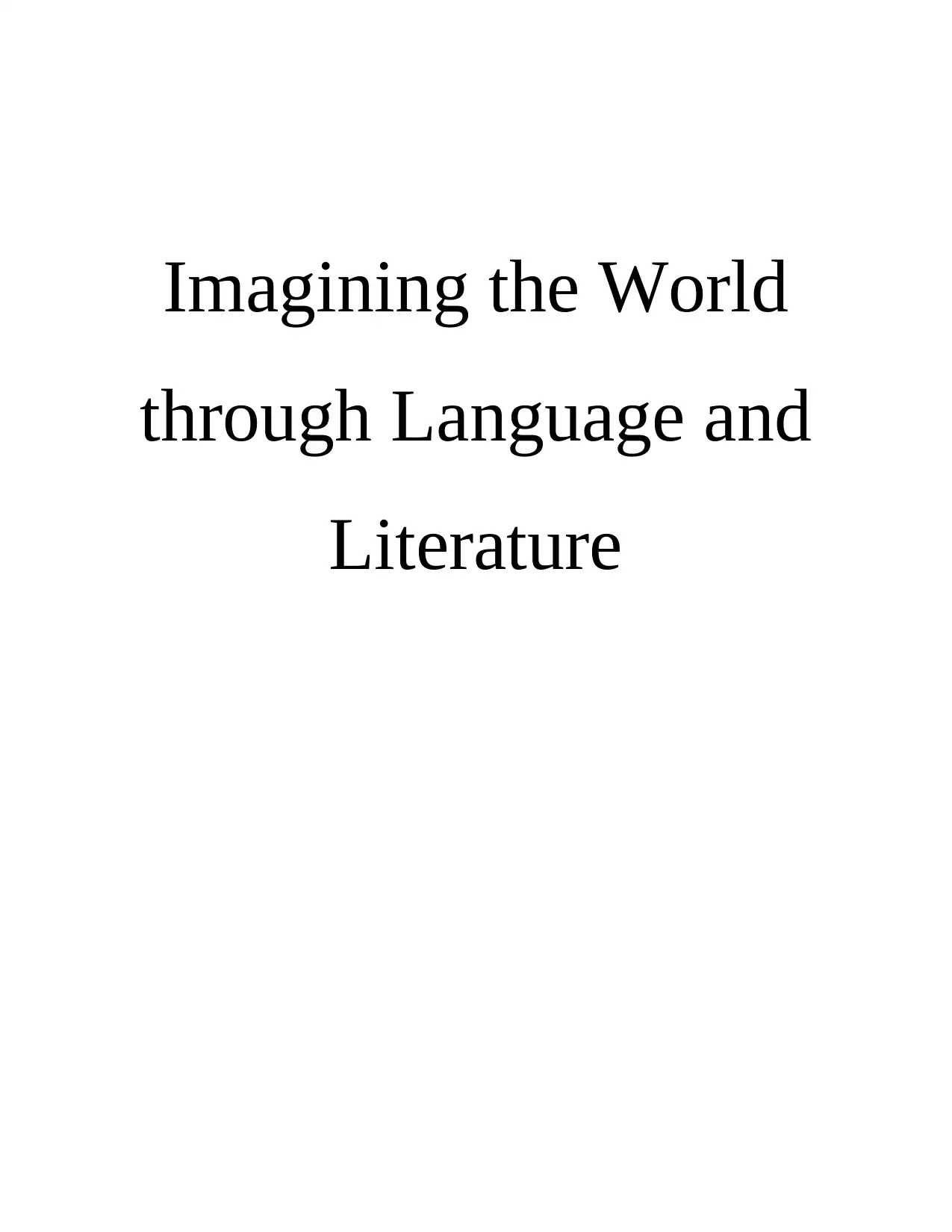
Imagining the World
through Language and
Literature
through Language and
Literature
Paraphrase This Document
Need a fresh take? Get an instant paraphrase of this document with our AI Paraphraser
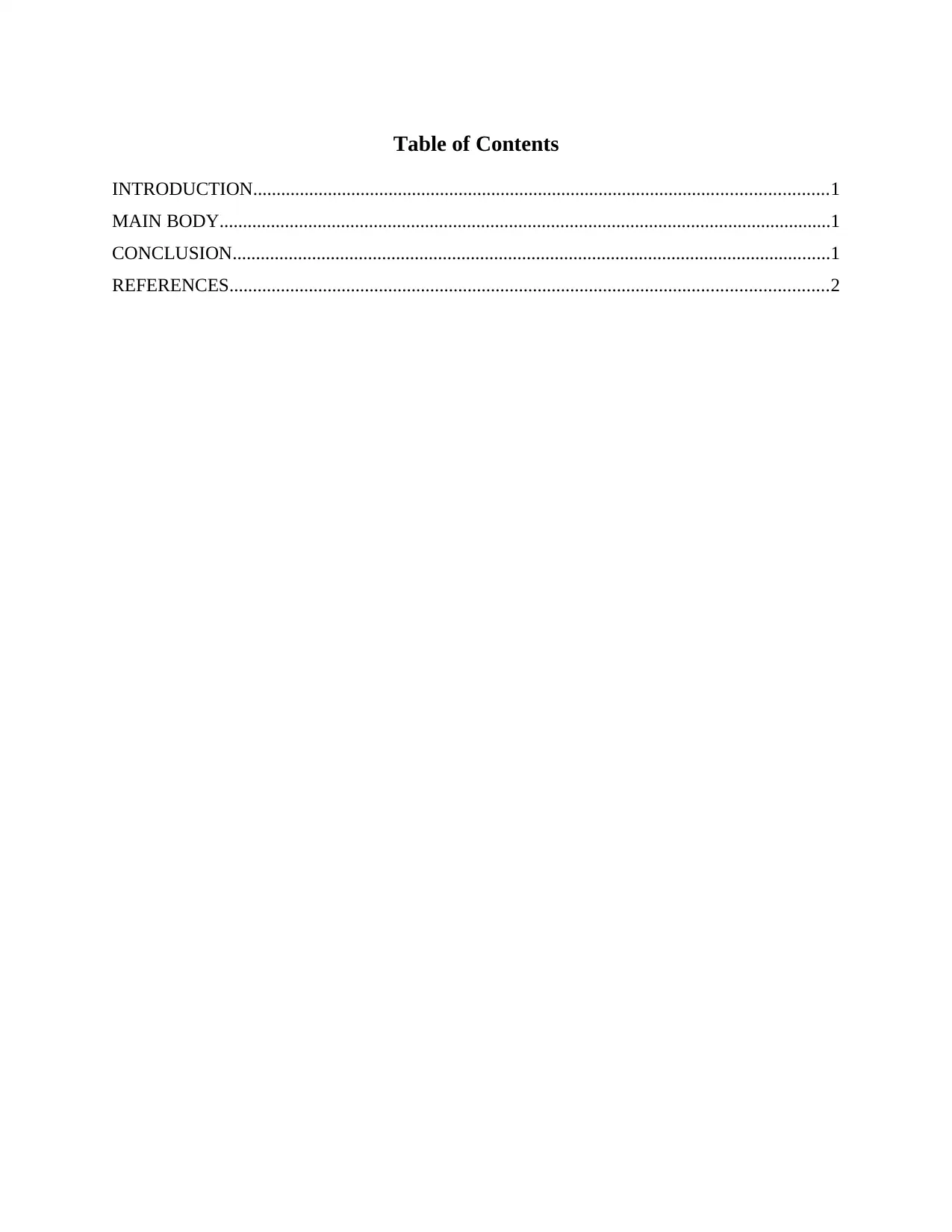
Table of Contents
INTRODUCTION...........................................................................................................................1
MAIN BODY...................................................................................................................................1
CONCLUSION................................................................................................................................1
REFERENCES................................................................................................................................2
INTRODUCTION...........................................................................................................................1
MAIN BODY...................................................................................................................................1
CONCLUSION................................................................................................................................1
REFERENCES................................................................................................................................2
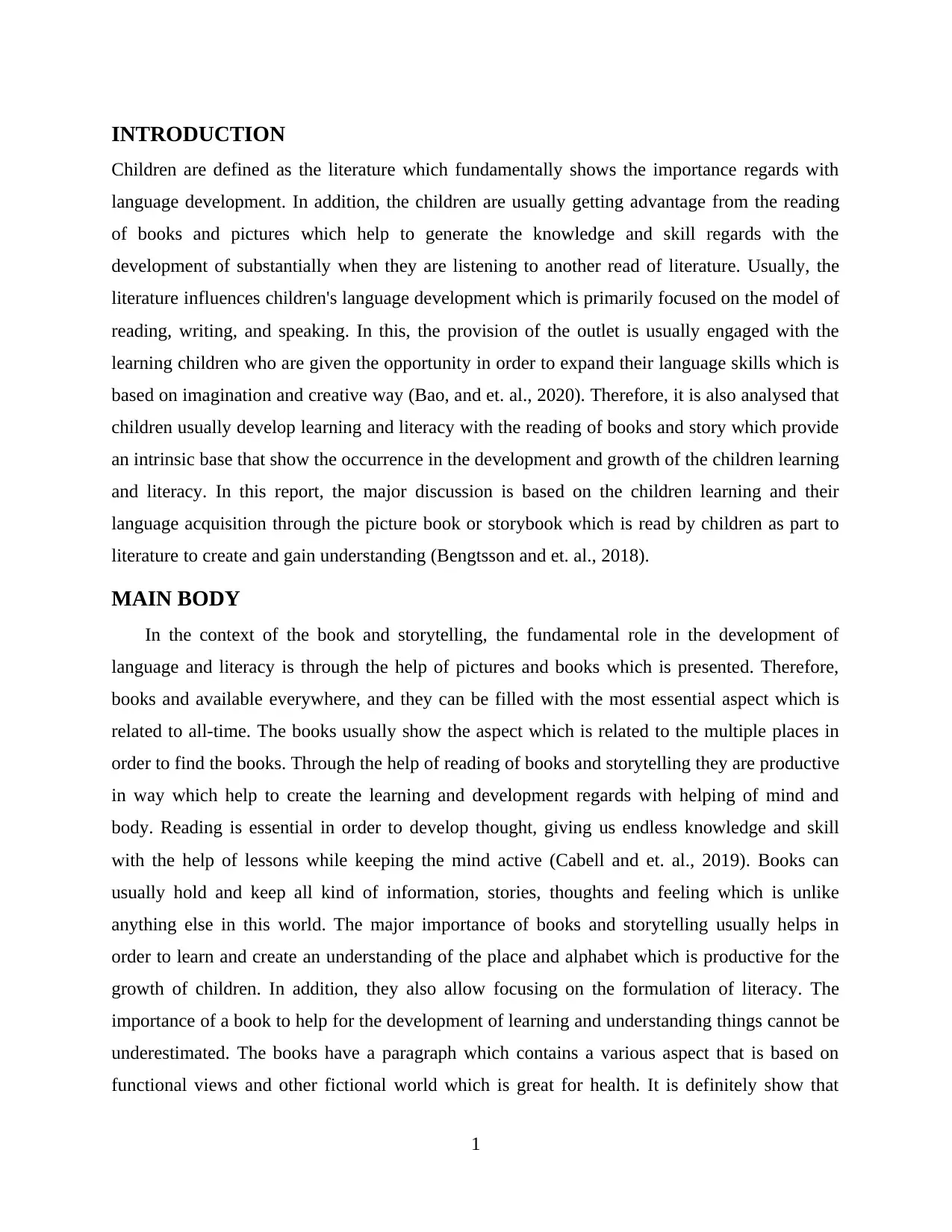
INTRODUCTION
Children are defined as the literature which fundamentally shows the importance regards with
language development. In addition, the children are usually getting advantage from the reading
of books and pictures which help to generate the knowledge and skill regards with the
development of substantially when they are listening to another read of literature. Usually, the
literature influences children's language development which is primarily focused on the model of
reading, writing, and speaking. In this, the provision of the outlet is usually engaged with the
learning children who are given the opportunity in order to expand their language skills which is
based on imagination and creative way (Bao, and et. al., 2020). Therefore, it is also analysed that
children usually develop learning and literacy with the reading of books and story which provide
an intrinsic base that show the occurrence in the development and growth of the children learning
and literacy. In this report, the major discussion is based on the children learning and their
language acquisition through the picture book or storybook which is read by children as part to
literature to create and gain understanding (Bengtsson and et. al., 2018).
MAIN BODY
In the context of the book and storytelling, the fundamental role in the development of
language and literacy is through the help of pictures and books which is presented. Therefore,
books and available everywhere, and they can be filled with the most essential aspect which is
related to all-time. The books usually show the aspect which is related to the multiple places in
order to find the books. Through the help of reading of books and storytelling they are productive
in way which help to create the learning and development regards with helping of mind and
body. Reading is essential in order to develop thought, giving us endless knowledge and skill
with the help of lessons while keeping the mind active (Cabell and et. al., 2019). Books can
usually hold and keep all kind of information, stories, thoughts and feeling which is unlike
anything else in this world. The major importance of books and storytelling usually helps in
order to learn and create an understanding of the place and alphabet which is productive for the
growth of children. In addition, they also allow focusing on the formulation of literacy. The
importance of a book to help for the development of learning and understanding things cannot be
underestimated. The books have a paragraph which contains a various aspect that is based on
functional views and other fictional world which is great for health. It is definitely show that
1
Children are defined as the literature which fundamentally shows the importance regards with
language development. In addition, the children are usually getting advantage from the reading
of books and pictures which help to generate the knowledge and skill regards with the
development of substantially when they are listening to another read of literature. Usually, the
literature influences children's language development which is primarily focused on the model of
reading, writing, and speaking. In this, the provision of the outlet is usually engaged with the
learning children who are given the opportunity in order to expand their language skills which is
based on imagination and creative way (Bao, and et. al., 2020). Therefore, it is also analysed that
children usually develop learning and literacy with the reading of books and story which provide
an intrinsic base that show the occurrence in the development and growth of the children learning
and literacy. In this report, the major discussion is based on the children learning and their
language acquisition through the picture book or storybook which is read by children as part to
literature to create and gain understanding (Bengtsson and et. al., 2018).
MAIN BODY
In the context of the book and storytelling, the fundamental role in the development of
language and literacy is through the help of pictures and books which is presented. Therefore,
books and available everywhere, and they can be filled with the most essential aspect which is
related to all-time. The books usually show the aspect which is related to the multiple places in
order to find the books. Through the help of reading of books and storytelling they are productive
in way which help to create the learning and development regards with helping of mind and
body. Reading is essential in order to develop thought, giving us endless knowledge and skill
with the help of lessons while keeping the mind active (Cabell and et. al., 2019). Books can
usually hold and keep all kind of information, stories, thoughts and feeling which is unlike
anything else in this world. The major importance of books and storytelling usually helps in
order to learn and create an understanding of the place and alphabet which is productive for the
growth of children. In addition, they also allow focusing on the formulation of literacy. The
importance of a book to help for the development of learning and understanding things cannot be
underestimated. The books have a paragraph which contains a various aspect that is based on
functional views and other fictional world which is great for health. It is definitely show that
1
⊘ This is a preview!⊘
Do you want full access?
Subscribe today to unlock all pages.

Trusted by 1+ million students worldwide
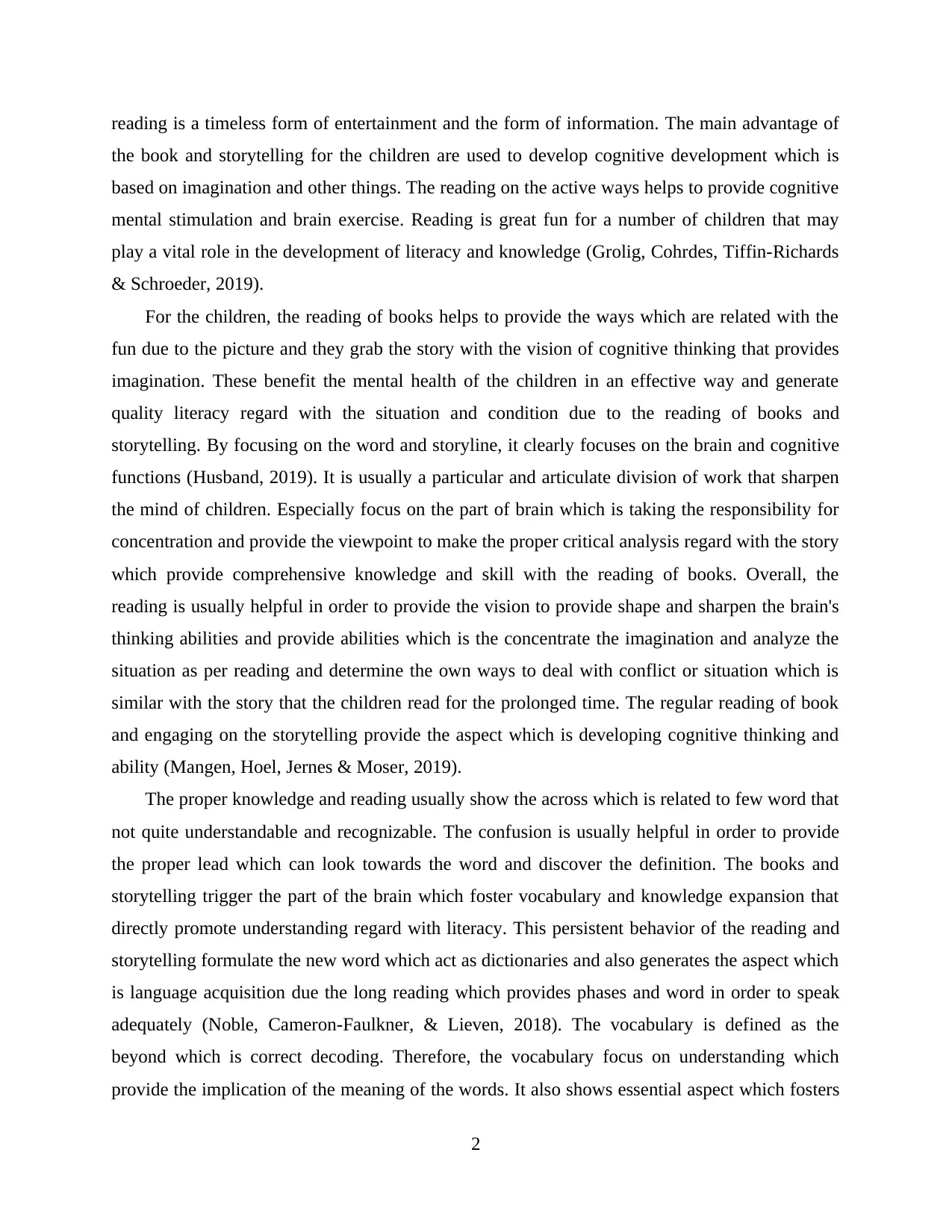
reading is a timeless form of entertainment and the form of information. The main advantage of
the book and storytelling for the children are used to develop cognitive development which is
based on imagination and other things. The reading on the active ways helps to provide cognitive
mental stimulation and brain exercise. Reading is great fun for a number of children that may
play a vital role in the development of literacy and knowledge (Grolig, Cohrdes, Tiffin-Richards
& Schroeder, 2019).
For the children, the reading of books helps to provide the ways which are related with the
fun due to the picture and they grab the story with the vision of cognitive thinking that provides
imagination. These benefit the mental health of the children in an effective way and generate
quality literacy regard with the situation and condition due to the reading of books and
storytelling. By focusing on the word and storyline, it clearly focuses on the brain and cognitive
functions (Husband, 2019). It is usually a particular and articulate division of work that sharpen
the mind of children. Especially focus on the part of brain which is taking the responsibility for
concentration and provide the viewpoint to make the proper critical analysis regard with the story
which provide comprehensive knowledge and skill with the reading of books. Overall, the
reading is usually helpful in order to provide the vision to provide shape and sharpen the brain's
thinking abilities and provide abilities which is the concentrate the imagination and analyze the
situation as per reading and determine the own ways to deal with conflict or situation which is
similar with the story that the children read for the prolonged time. The regular reading of book
and engaging on the storytelling provide the aspect which is developing cognitive thinking and
ability (Mangen, Hoel, Jernes & Moser, 2019).
The proper knowledge and reading usually show the across which is related to few word that
not quite understandable and recognizable. The confusion is usually helpful in order to provide
the proper lead which can look towards the word and discover the definition. The books and
storytelling trigger the part of the brain which foster vocabulary and knowledge expansion that
directly promote understanding regard with literacy. This persistent behavior of the reading and
storytelling formulate the new word which act as dictionaries and also generates the aspect which
is language acquisition due the long reading which provides phases and word in order to speak
adequately (Noble, Cameron-Faulkner, & Lieven, 2018). The vocabulary is defined as the
beyond which is correct decoding. Therefore, the vocabulary focus on understanding which
provide the implication of the meaning of the words. It also shows essential aspect which fosters
2
the book and storytelling for the children are used to develop cognitive development which is
based on imagination and other things. The reading on the active ways helps to provide cognitive
mental stimulation and brain exercise. Reading is great fun for a number of children that may
play a vital role in the development of literacy and knowledge (Grolig, Cohrdes, Tiffin-Richards
& Schroeder, 2019).
For the children, the reading of books helps to provide the ways which are related with the
fun due to the picture and they grab the story with the vision of cognitive thinking that provides
imagination. These benefit the mental health of the children in an effective way and generate
quality literacy regard with the situation and condition due to the reading of books and
storytelling. By focusing on the word and storyline, it clearly focuses on the brain and cognitive
functions (Husband, 2019). It is usually a particular and articulate division of work that sharpen
the mind of children. Especially focus on the part of brain which is taking the responsibility for
concentration and provide the viewpoint to make the proper critical analysis regard with the story
which provide comprehensive knowledge and skill with the reading of books. Overall, the
reading is usually helpful in order to provide the vision to provide shape and sharpen the brain's
thinking abilities and provide abilities which is the concentrate the imagination and analyze the
situation as per reading and determine the own ways to deal with conflict or situation which is
similar with the story that the children read for the prolonged time. The regular reading of book
and engaging on the storytelling provide the aspect which is developing cognitive thinking and
ability (Mangen, Hoel, Jernes & Moser, 2019).
The proper knowledge and reading usually show the across which is related to few word that
not quite understandable and recognizable. The confusion is usually helpful in order to provide
the proper lead which can look towards the word and discover the definition. The books and
storytelling trigger the part of the brain which foster vocabulary and knowledge expansion that
directly promote understanding regard with literacy. This persistent behavior of the reading and
storytelling formulate the new word which act as dictionaries and also generates the aspect which
is language acquisition due the long reading which provides phases and word in order to speak
adequately (Noble, Cameron-Faulkner, & Lieven, 2018). The vocabulary is defined as the
beyond which is correct decoding. Therefore, the vocabulary focus on understanding which
provide the implication of the meaning of the words. It also shows essential aspect which fosters
2
Paraphrase This Document
Need a fresh take? Get an instant paraphrase of this document with our AI Paraphraser
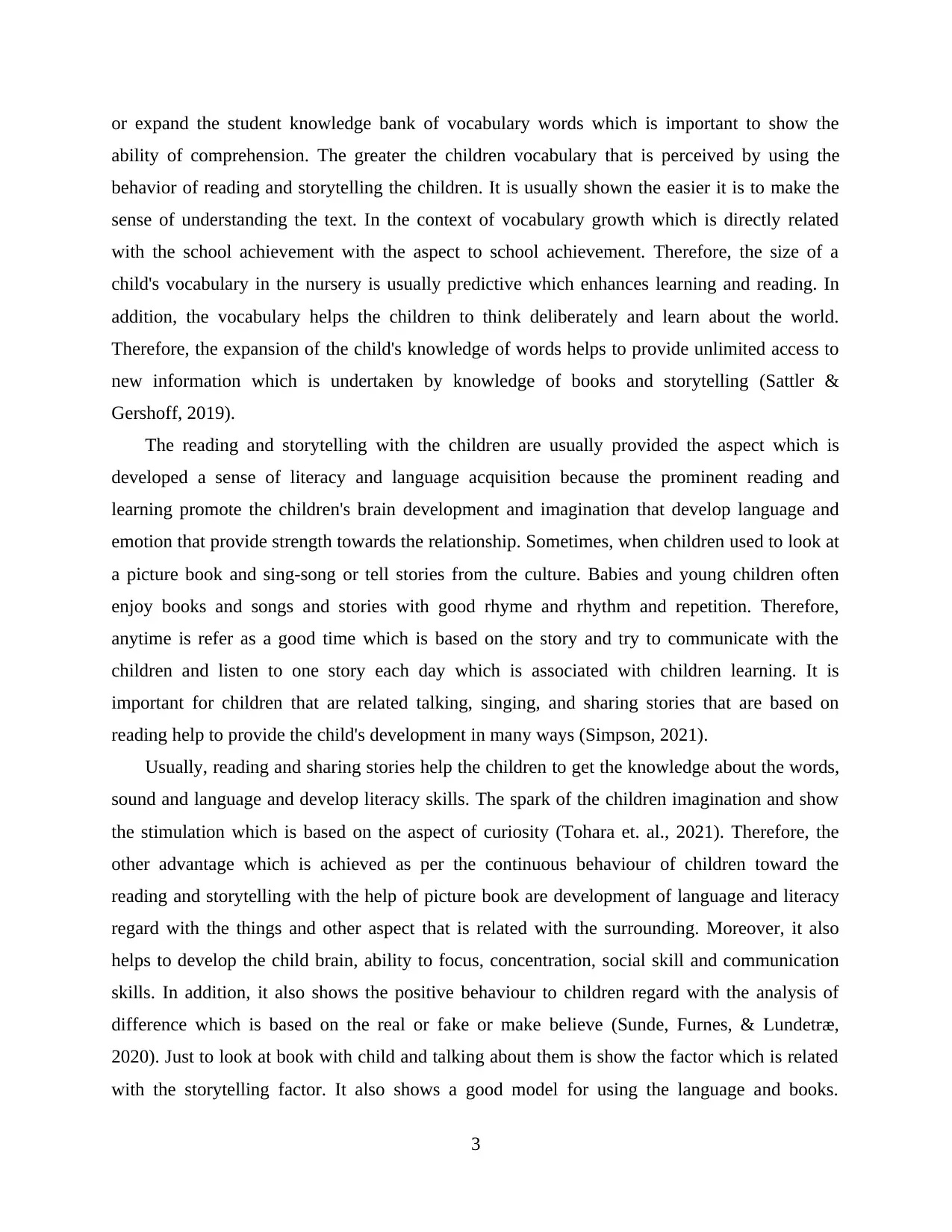
or expand the student knowledge bank of vocabulary words which is important to show the
ability of comprehension. The greater the children vocabulary that is perceived by using the
behavior of reading and storytelling the children. It is usually shown the easier it is to make the
sense of understanding the text. In the context of vocabulary growth which is directly related
with the school achievement with the aspect to school achievement. Therefore, the size of a
child's vocabulary in the nursery is usually predictive which enhances learning and reading. In
addition, the vocabulary helps the children to think deliberately and learn about the world.
Therefore, the expansion of the child's knowledge of words helps to provide unlimited access to
new information which is undertaken by knowledge of books and storytelling (Sattler &
Gershoff, 2019).
The reading and storytelling with the children are usually provided the aspect which is
developed a sense of literacy and language acquisition because the prominent reading and
learning promote the children's brain development and imagination that develop language and
emotion that provide strength towards the relationship. Sometimes, when children used to look at
a picture book and sing-song or tell stories from the culture. Babies and young children often
enjoy books and songs and stories with good rhyme and rhythm and repetition. Therefore,
anytime is refer as a good time which is based on the story and try to communicate with the
children and listen to one story each day which is associated with children learning. It is
important for children that are related talking, singing, and sharing stories that are based on
reading help to provide the child's development in many ways (Simpson, 2021).
Usually, reading and sharing stories help the children to get the knowledge about the words,
sound and language and develop literacy skills. The spark of the children imagination and show
the stimulation which is based on the aspect of curiosity (Tohara et. al., 2021). Therefore, the
other advantage which is achieved as per the continuous behaviour of children toward the
reading and storytelling with the help of picture book are development of language and literacy
regard with the things and other aspect that is related with the surrounding. Moreover, it also
helps to develop the child brain, ability to focus, concentration, social skill and communication
skills. In addition, it also shows the positive behaviour to children regard with the analysis of
difference which is based on the real or fake or make believe (Sunde, Furnes, & Lundetræ,
2020). Just to look at book with child and talking about them is show the factor which is related
with the storytelling factor. It also shows a good model for using the language and books.
3
ability of comprehension. The greater the children vocabulary that is perceived by using the
behavior of reading and storytelling the children. It is usually shown the easier it is to make the
sense of understanding the text. In the context of vocabulary growth which is directly related
with the school achievement with the aspect to school achievement. Therefore, the size of a
child's vocabulary in the nursery is usually predictive which enhances learning and reading. In
addition, the vocabulary helps the children to think deliberately and learn about the world.
Therefore, the expansion of the child's knowledge of words helps to provide unlimited access to
new information which is undertaken by knowledge of books and storytelling (Sattler &
Gershoff, 2019).
The reading and storytelling with the children are usually provided the aspect which is
developed a sense of literacy and language acquisition because the prominent reading and
learning promote the children's brain development and imagination that develop language and
emotion that provide strength towards the relationship. Sometimes, when children used to look at
a picture book and sing-song or tell stories from the culture. Babies and young children often
enjoy books and songs and stories with good rhyme and rhythm and repetition. Therefore,
anytime is refer as a good time which is based on the story and try to communicate with the
children and listen to one story each day which is associated with children learning. It is
important for children that are related talking, singing, and sharing stories that are based on
reading help to provide the child's development in many ways (Simpson, 2021).
Usually, reading and sharing stories help the children to get the knowledge about the words,
sound and language and develop literacy skills. The spark of the children imagination and show
the stimulation which is based on the aspect of curiosity (Tohara et. al., 2021). Therefore, the
other advantage which is achieved as per the continuous behaviour of children toward the
reading and storytelling with the help of picture book are development of language and literacy
regard with the things and other aspect that is related with the surrounding. Moreover, it also
helps to develop the child brain, ability to focus, concentration, social skill and communication
skills. In addition, it also shows the positive behaviour to children regard with the analysis of
difference which is based on the real or fake or make believe (Sunde, Furnes, & Lundetræ,
2020). Just to look at book with child and talking about them is show the factor which is related
with the storytelling factor. It also shows a good model for using the language and books.
3
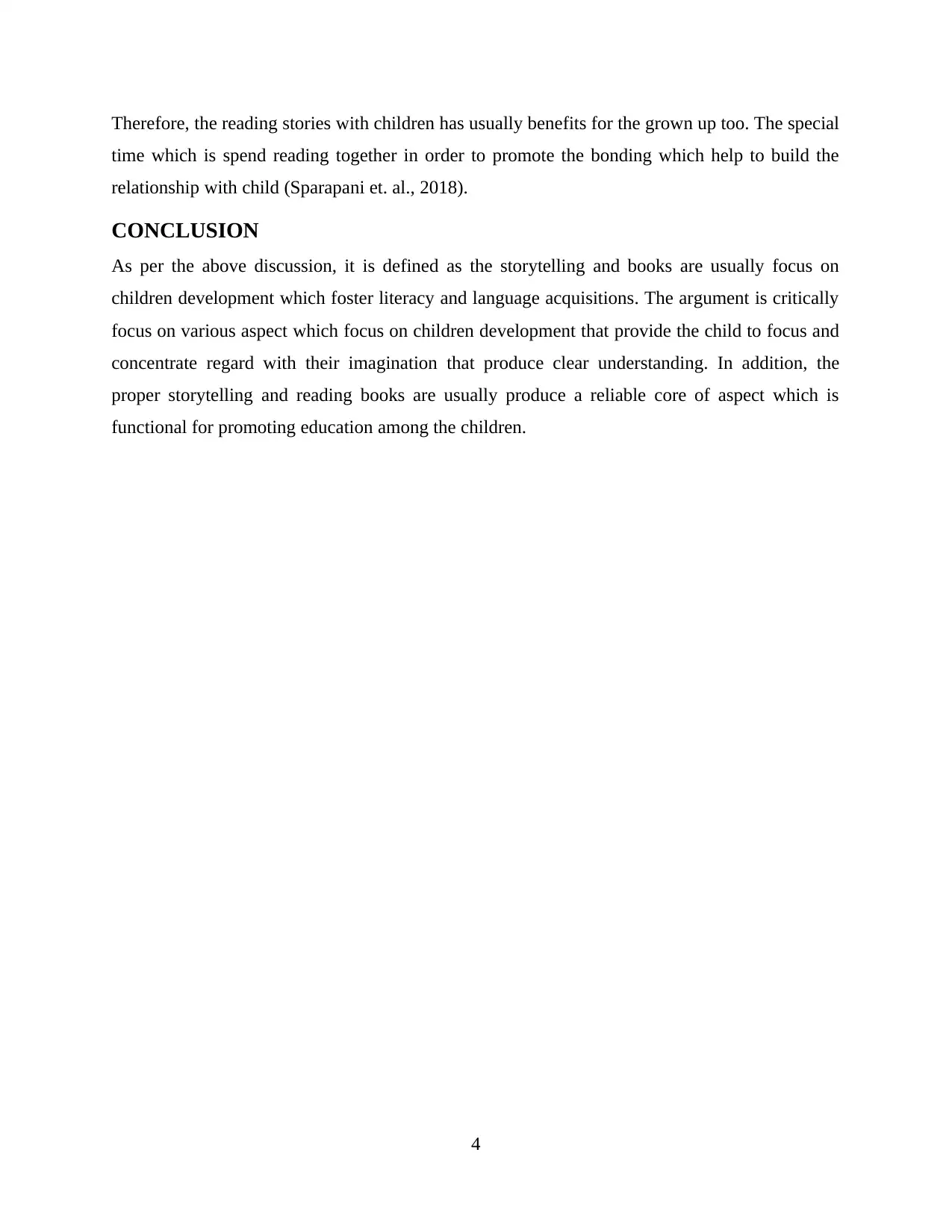
Therefore, the reading stories with children has usually benefits for the grown up too. The special
time which is spend reading together in order to promote the bonding which help to build the
relationship with child (Sparapani et. al., 2018).
CONCLUSION
As per the above discussion, it is defined as the storytelling and books are usually focus on
children development which foster literacy and language acquisitions. The argument is critically
focus on various aspect which focus on children development that provide the child to focus and
concentrate regard with their imagination that produce clear understanding. In addition, the
proper storytelling and reading books are usually produce a reliable core of aspect which is
functional for promoting education among the children.
4
time which is spend reading together in order to promote the bonding which help to build the
relationship with child (Sparapani et. al., 2018).
CONCLUSION
As per the above discussion, it is defined as the storytelling and books are usually focus on
children development which foster literacy and language acquisitions. The argument is critically
focus on various aspect which focus on children development that provide the child to focus and
concentrate regard with their imagination that produce clear understanding. In addition, the
proper storytelling and reading books are usually produce a reliable core of aspect which is
functional for promoting education among the children.
4
⊘ This is a preview!⊘
Do you want full access?
Subscribe today to unlock all pages.

Trusted by 1+ million students worldwide
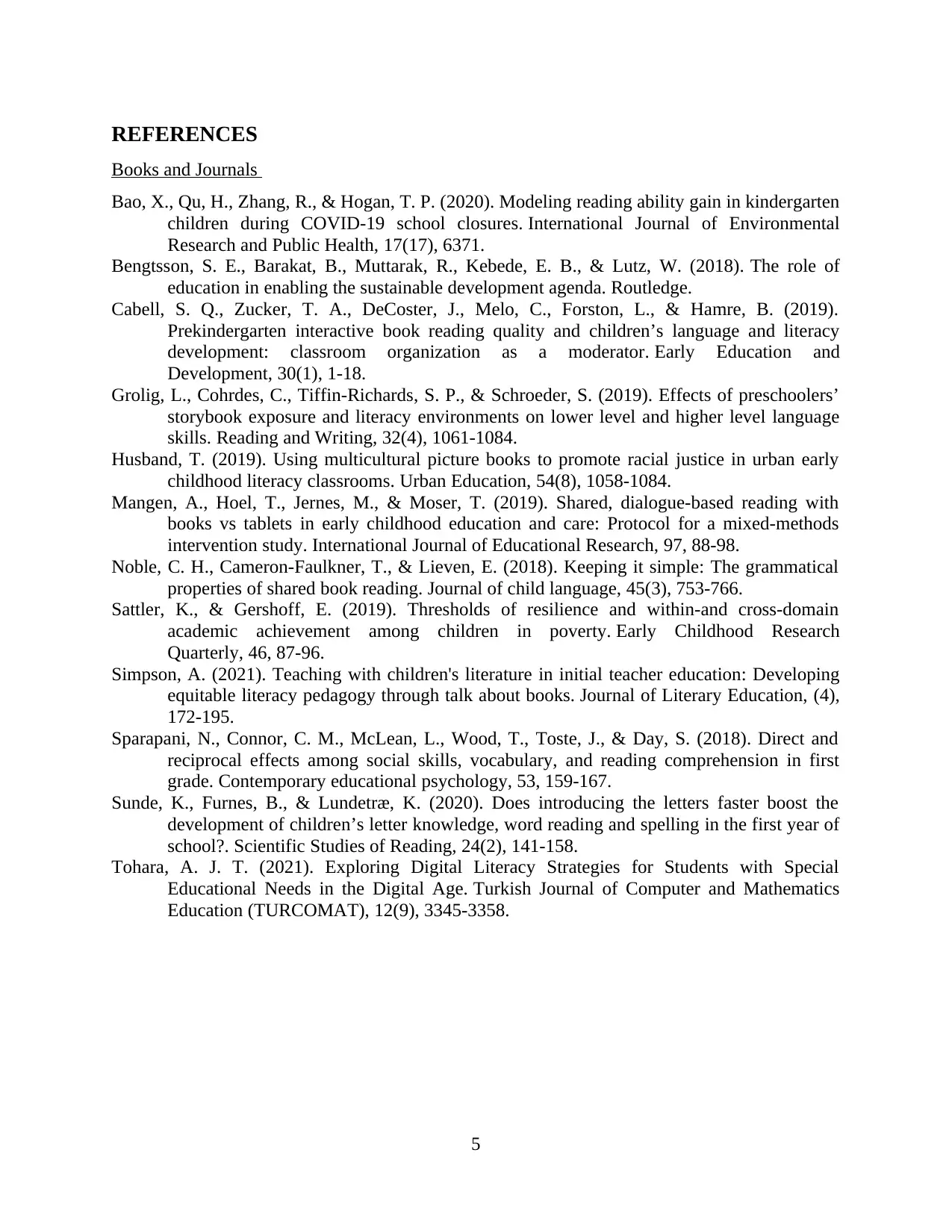
REFERENCES
Books and Journals
Bao, X., Qu, H., Zhang, R., & Hogan, T. P. (2020). Modeling reading ability gain in kindergarten
children during COVID-19 school closures. International Journal of Environmental
Research and Public Health, 17(17), 6371.
Bengtsson, S. E., Barakat, B., Muttarak, R., Kebede, E. B., & Lutz, W. (2018). The role of
education in enabling the sustainable development agenda. Routledge.
Cabell, S. Q., Zucker, T. A., DeCoster, J., Melo, C., Forston, L., & Hamre, B. (2019).
Prekindergarten interactive book reading quality and children’s language and literacy
development: classroom organization as a moderator. Early Education and
Development, 30(1), 1-18.
Grolig, L., Cohrdes, C., Tiffin-Richards, S. P., & Schroeder, S. (2019). Effects of preschoolers’
storybook exposure and literacy environments on lower level and higher level language
skills. Reading and Writing, 32(4), 1061-1084.
Husband, T. (2019). Using multicultural picture books to promote racial justice in urban early
childhood literacy classrooms. Urban Education, 54(8), 1058-1084.
Mangen, A., Hoel, T., Jernes, M., & Moser, T. (2019). Shared, dialogue-based reading with
books vs tablets in early childhood education and care: Protocol for a mixed-methods
intervention study. International Journal of Educational Research, 97, 88-98.
Noble, C. H., Cameron-Faulkner, T., & Lieven, E. (2018). Keeping it simple: The grammatical
properties of shared book reading. Journal of child language, 45(3), 753-766.
Sattler, K., & Gershoff, E. (2019). Thresholds of resilience and within-and cross-domain
academic achievement among children in poverty. Early Childhood Research
Quarterly, 46, 87-96.
Simpson, A. (2021). Teaching with children's literature in initial teacher education: Developing
equitable literacy pedagogy through talk about books. Journal of Literary Education, (4),
172-195.
Sparapani, N., Connor, C. M., McLean, L., Wood, T., Toste, J., & Day, S. (2018). Direct and
reciprocal effects among social skills, vocabulary, and reading comprehension in first
grade. Contemporary educational psychology, 53, 159-167.
Sunde, K., Furnes, B., & Lundetræ, K. (2020). Does introducing the letters faster boost the
development of children’s letter knowledge, word reading and spelling in the first year of
school?. Scientific Studies of Reading, 24(2), 141-158.
Tohara, A. J. T. (2021). Exploring Digital Literacy Strategies for Students with Special
Educational Needs in the Digital Age. Turkish Journal of Computer and Mathematics
Education (TURCOMAT), 12(9), 3345-3358.
5
Books and Journals
Bao, X., Qu, H., Zhang, R., & Hogan, T. P. (2020). Modeling reading ability gain in kindergarten
children during COVID-19 school closures. International Journal of Environmental
Research and Public Health, 17(17), 6371.
Bengtsson, S. E., Barakat, B., Muttarak, R., Kebede, E. B., & Lutz, W. (2018). The role of
education in enabling the sustainable development agenda. Routledge.
Cabell, S. Q., Zucker, T. A., DeCoster, J., Melo, C., Forston, L., & Hamre, B. (2019).
Prekindergarten interactive book reading quality and children’s language and literacy
development: classroom organization as a moderator. Early Education and
Development, 30(1), 1-18.
Grolig, L., Cohrdes, C., Tiffin-Richards, S. P., & Schroeder, S. (2019). Effects of preschoolers’
storybook exposure and literacy environments on lower level and higher level language
skills. Reading and Writing, 32(4), 1061-1084.
Husband, T. (2019). Using multicultural picture books to promote racial justice in urban early
childhood literacy classrooms. Urban Education, 54(8), 1058-1084.
Mangen, A., Hoel, T., Jernes, M., & Moser, T. (2019). Shared, dialogue-based reading with
books vs tablets in early childhood education and care: Protocol for a mixed-methods
intervention study. International Journal of Educational Research, 97, 88-98.
Noble, C. H., Cameron-Faulkner, T., & Lieven, E. (2018). Keeping it simple: The grammatical
properties of shared book reading. Journal of child language, 45(3), 753-766.
Sattler, K., & Gershoff, E. (2019). Thresholds of resilience and within-and cross-domain
academic achievement among children in poverty. Early Childhood Research
Quarterly, 46, 87-96.
Simpson, A. (2021). Teaching with children's literature in initial teacher education: Developing
equitable literacy pedagogy through talk about books. Journal of Literary Education, (4),
172-195.
Sparapani, N., Connor, C. M., McLean, L., Wood, T., Toste, J., & Day, S. (2018). Direct and
reciprocal effects among social skills, vocabulary, and reading comprehension in first
grade. Contemporary educational psychology, 53, 159-167.
Sunde, K., Furnes, B., & Lundetræ, K. (2020). Does introducing the letters faster boost the
development of children’s letter knowledge, word reading and spelling in the first year of
school?. Scientific Studies of Reading, 24(2), 141-158.
Tohara, A. J. T. (2021). Exploring Digital Literacy Strategies for Students with Special
Educational Needs in the Digital Age. Turkish Journal of Computer and Mathematics
Education (TURCOMAT), 12(9), 3345-3358.
5
Paraphrase This Document
Need a fresh take? Get an instant paraphrase of this document with our AI Paraphraser

6
1 out of 8
Related Documents
Your All-in-One AI-Powered Toolkit for Academic Success.
+13062052269
info@desklib.com
Available 24*7 on WhatsApp / Email
![[object Object]](/_next/static/media/star-bottom.7253800d.svg)
Unlock your academic potential
Copyright © 2020–2026 A2Z Services. All Rights Reserved. Developed and managed by ZUCOL.





